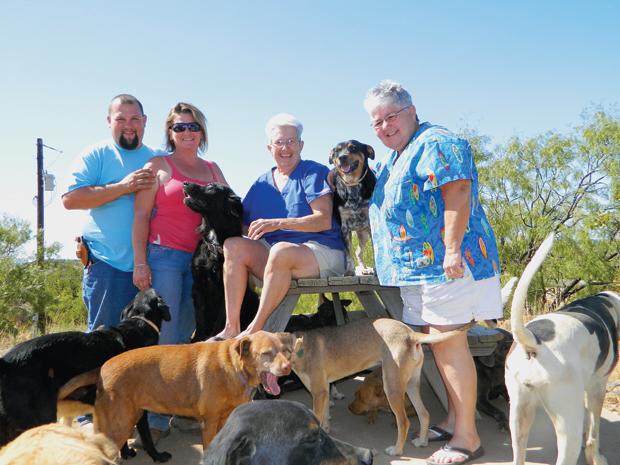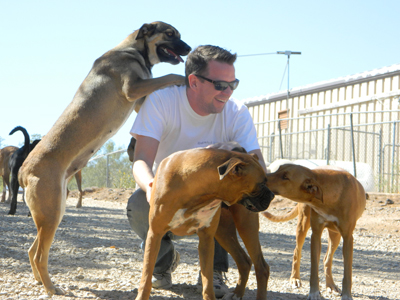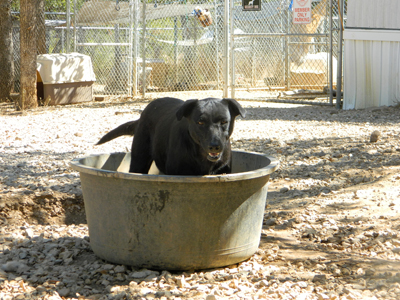Animal Angels Rescue provides unwanted beasts a chance at a better life

ANGELS IN AMERICA | A Jacksboro animal sanctuary benefits from, from left, Matt and Beth Kelley, Carole Sanders and Nita Burgoon, who serve 300-plus dogs and horses. (Photo courtesy Rodrigo Orta)
STEVEN LINDSEY | Contributing Writer
stevencraiglindsey@me.com
There are dog lovers, and then there’s Carole Sanders. With 300 dogs and counting under her roof, Sanders’ Animal Angels Rescue, Rehabilitation, Adoption and Sanctuary represents a last chance for many unwanted canines. But unlike the fate of many other homeless animals on this 38-acre ranch in Jacksboro, Texas, these dogs (and 18 horses) have a place to live out the rest of their lives with food, shelter and most of all, love.
Sanders, now 72, loved dogs from a very early age and knew that somehow her life would end up in the service of animals.
“I just didn’t know I was going to do anything at this level, but I’ve always seen the need out there and I have the will and determination to do what I had to accomplish. You have

OVERRUN WITH DOGS | The author, above, learns first-hand how friendly a rescue dog can be — and how adorable they are just being themselves, below. (Photos courtesy Rodrigo Orta)
to take time,” she says. “If you try to do too much too fast, you can’t do it well. That’s why some rescue groups burn out and fail.”
It was vitally important to Sanders that the sanctuary, which she started in 1992, grow slowly and that everything was in place to sustain it. In 1993, Animal Angels received its non-profit 501(c)3 tax status. Then in 2001, Sanders retired after 40 years of serving a completely different yet equally unruly animal — the airline passenger.
“After being a flight attendant for so long, I figured out that I’m a giver,” she says.
Thankfully, she’s not alone in the giving department. Along with her life partner, Nita Burgoon, Sanders continues to buy up surrounding land — not just to provide more space for the dogs, but to keep neighbors far, far away (300 barking dogs could lead to complaints that might jeopardize the entire mission).
In the cozy lodge that Burgoon had custom-built for the couple, more than a dozen smaller dogs have graciously allowed the two women to share their space, though it’s difficult to find a chair, sofa or any other soft surface without a furry face staring up from it.
More recently, former Operation Kindness intake coordinator Beth Kelley, her husband Matt, and three children have moved into a house on the property and are in charge of many of the daily chores and upkeep that an organization like this entails. Serving the needs of the animals has created a unique situation for Kelley and her family.
“When making the decision to all work at the sanctuary as a family and not having to commute to an outside source of income we feel that we not only have enhanced the upbringing of our children, but the lives of animals that are in great need while educating the community that we live in,” she says.
Part of that education is in-your-face messages that appear on every Animal Angels vehicle. “Only and idiot would let a dog ride in the bed of a truck” adorns their pick-ups; a gestured middle finger from bubbas who drive past isn’t uncommon.
Other messages are less provocative, though no less thought-provoking — like the fact that one female dog and one male dog can be responsible for 67,000 more dogs in just seven years. (For cats, that’s 420,000 in the same time frame.) These statistics are just one of the many reasons that every dog at Animal Angels is spayed or neutered by a vet who comes to the on-site medical facility at least once per month.
With all the dogs spayed or neutered, there is no threat of breeding, thus presenting opportunities for less restrictive doggie interaction. When Kelley first came on the scene in February of last year, most of the dogs were in chain-link “neighborhoods,” large fenced-in areas where dogs could socialize with each other in like-minded packs.
“We couldn’t let them roam the whole property at the time because we didn’t have a full perimeter fence,” Sanders says. “So the best solution was large neighborhoods with dogs that got along. We’ve now taken it a step further. Other sanctuaries still have a lot of pens, but here we have a lot out and I think that’s the best place for them. Thanks to Beth, she started turning dogs loose left and right.”
 Now there are more than 170 dogs that are lovingly called “free range.” Dozens of shelters dot the landscape under large trees and among rocks and low-lying bushes. Huge containers of dog food are available on-demand for any dog with an appetite. And baby pools serve as the drinking bowls necessary to quench the thirst of so many active animals.
Now there are more than 170 dogs that are lovingly called “free range.” Dozens of shelters dot the landscape under large trees and among rocks and low-lying bushes. Huge containers of dog food are available on-demand for any dog with an appetite. And baby pools serve as the drinking bowls necessary to quench the thirst of so many active animals.
What’s immediately noticeable after spending any amount of time at Animal Angels is how sublimely happy the dogs appear. With little hope of adoption, they’re still able to get the human interaction that many (though not all) crave. Even more importantly, they benefit from the instinctual bonding with fellow dogs. Throughout the grounds, packs have formed naturally and few dogs within any of them venture into the territory of others. Occasionally they fight, but little more than a growl or a quick nip is needed to keep the peace.
The remaining 130 or so dogs are segregated into neighborhoods for good reasons. For one group, they’re too small to roam freely and safely among a majority of large-breed dogs. Others have been in the neighborhoods too long to adapt to a life outside their fences. The rest simply can’t be trusted to be loose because they don’t get along with people.
With other dogs, however, they’re right at home.
Not all dogs that come to Animal Angels are immediately lifers, either. Puppies, small breeds and other more “adoptable” dogs are given to rescue groups that will give them a much greater chance of finding a forever home. If that doesn’t work out, they always have a place at the sanctuary.
Yet keeping the sanctuary operational takes more than the 24/7 dedication of Sanders and her crew — it requires consistent monetary donations. Animal Angels is able to purchase food, medication and other supplies at such deep discounts that they can stretch a dollar — an important skill given that they need approximately 10,000 pounds of dog food per month just to feed their current residents. That doesn’t include any other operational or medical expenses.
But one look at the loving eyes, happy faces, and spastically wagging tails and it’s clear that these dogs have found heaven on earth. And Sanders, Burgoon and the entire Kelley family truly are angels to each and every one of them.
“You can’t save them all, but you try. That’s what counts,” Sanders says. “You do the best you can.”
To learn more, or to donate, visit AnimalAngelsTexas.org.
This article appeared in the Dallas Voice print edition December 16, 2011.














Great Story! As a volunteer for Animal Angels, we really appreciate the exposure! There are not many – even in the rescue scene – that know we exist!
Thank You!!!
This is a really well-written article. You really “got it”! Yes, the humans are all angels too!
Great story relating the work of my old friend from high school (Sanders, as we call her). Don’t see how a body can contain a heart that big. She also cares for humans who need her love. The sanctuary is an interesting place to see – quite unique. Thanks for noticing!
Great article Carole. A continued thanks for all that you and the crew do for the animals.